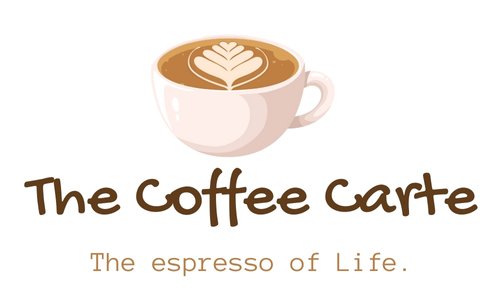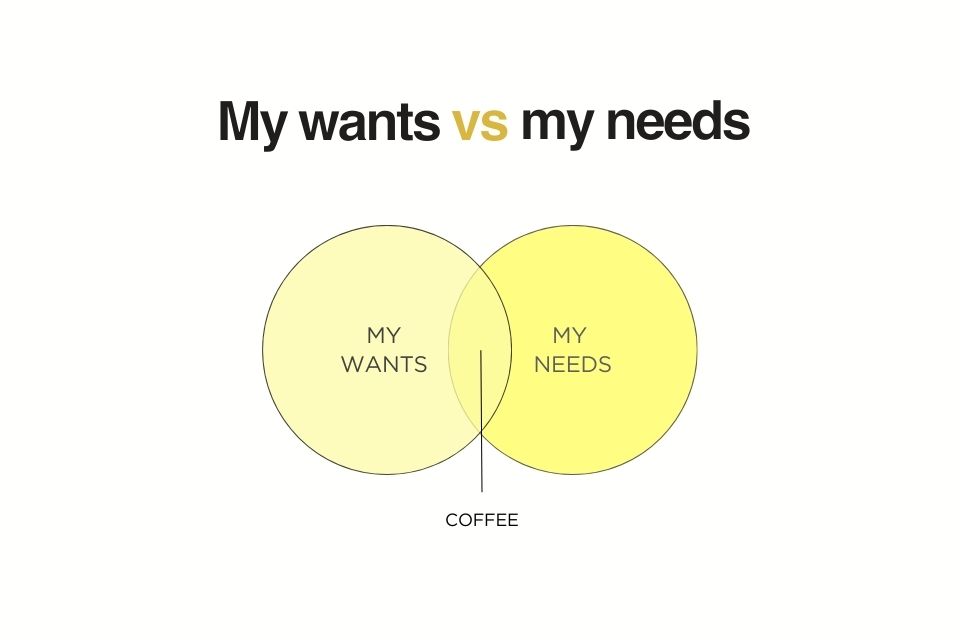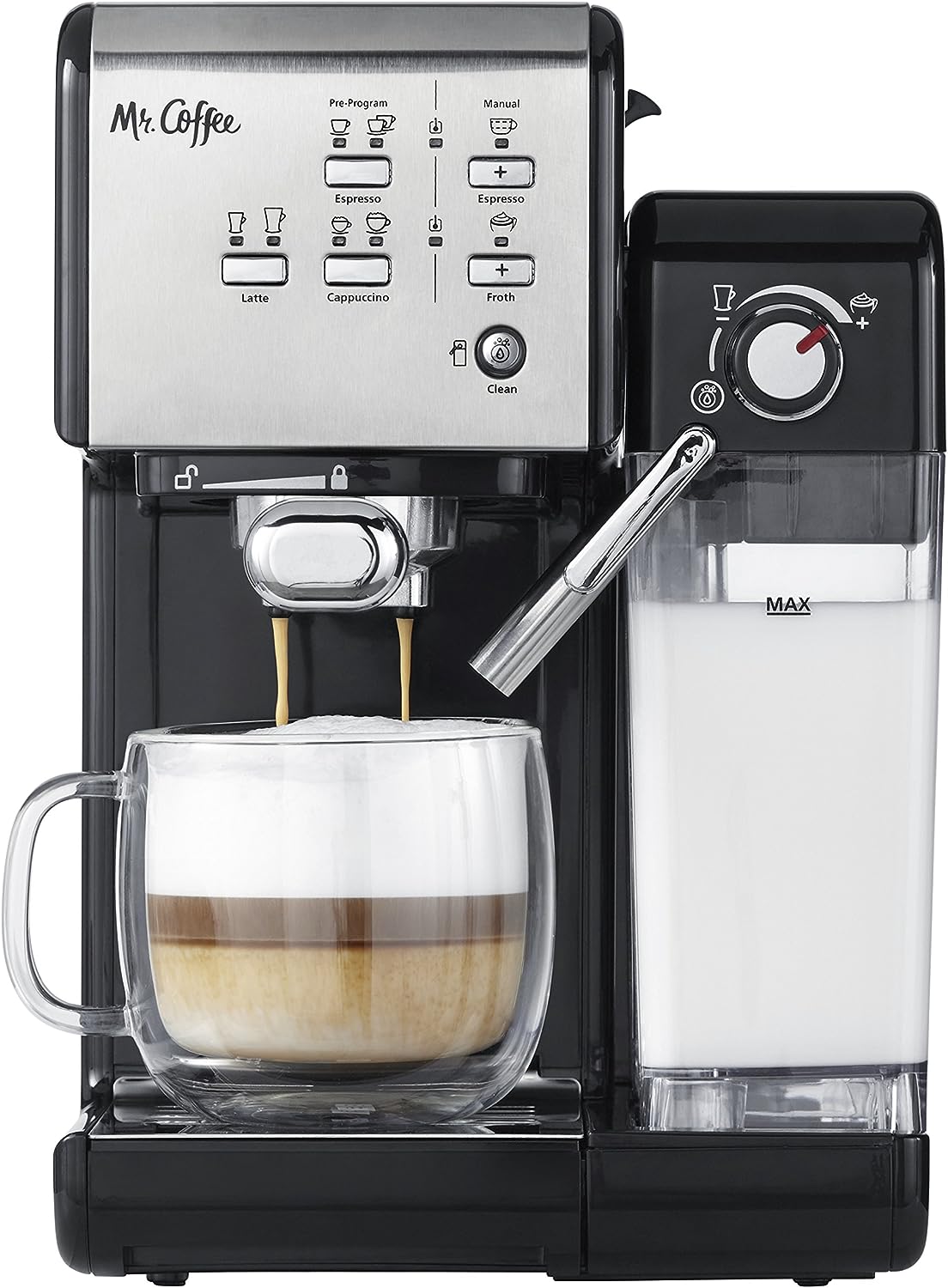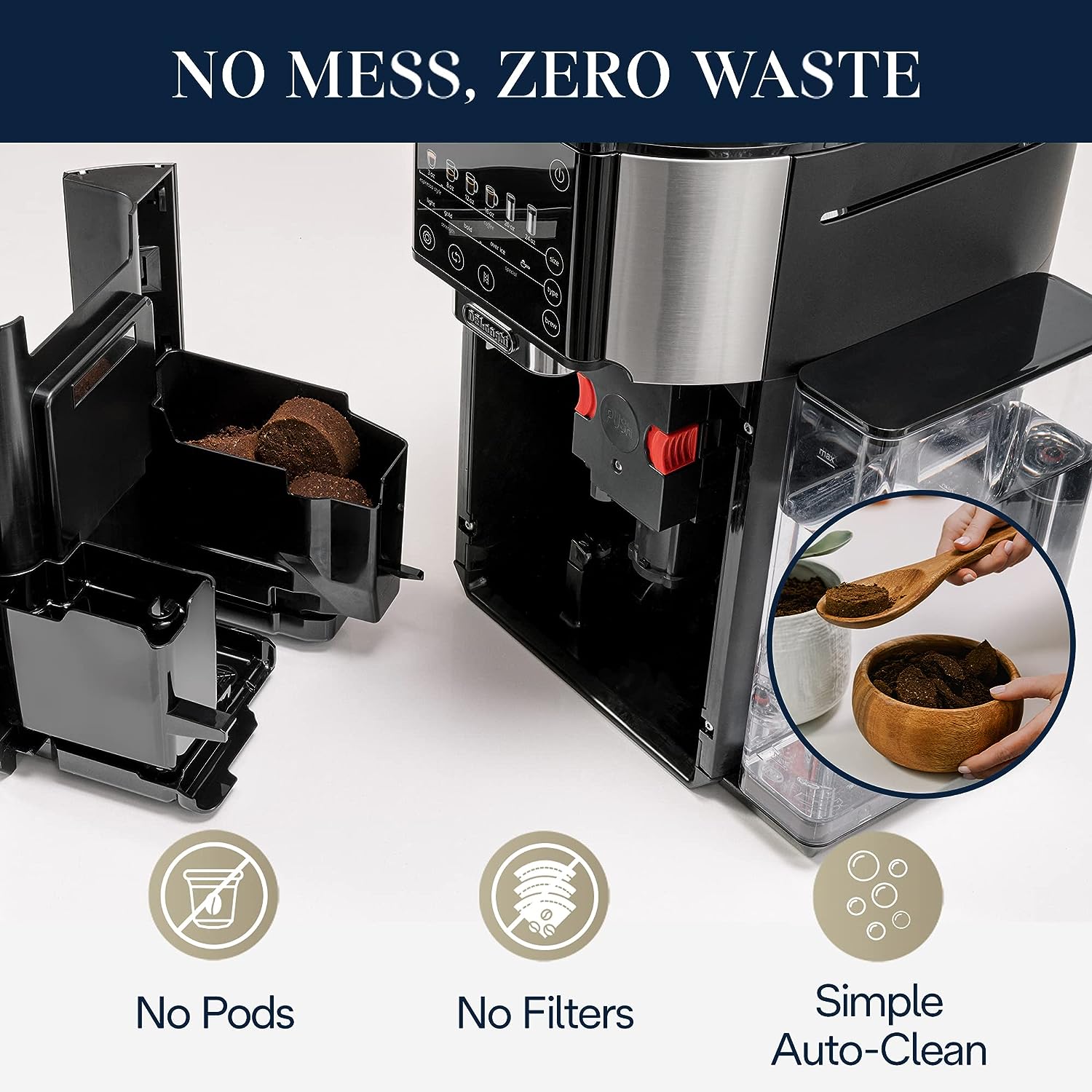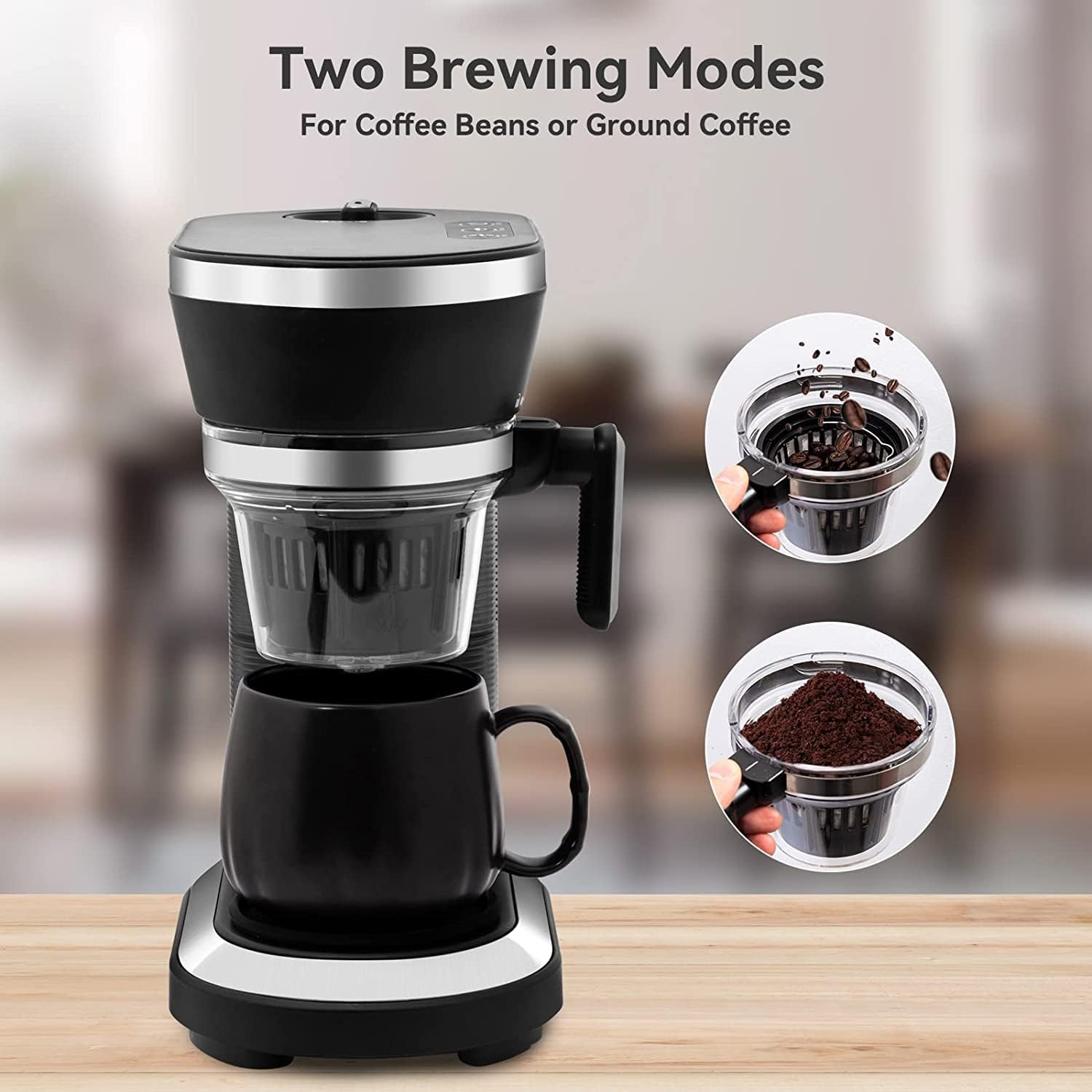What is the difference between caffeinated and decaffeinated coffee?
One cup of joe can spark drastically different reactions, and it all boils down to caffeine content. Caffeinated coffee drives our workdays – an intimate alliance between aromatic compounds, water, and a stimulant known worldwide: caffeine.
With its invigorating impact on the nervous system, it energizes us through lethargic mornings and helps us slip past afternoon slumps.
Decaffeinated coffee, on the other hand, gives almost every coffee lover’s favored flavor without the jolt of energy or fretful nights. This unique drip portrays an impressive magic trick by roasting and grounding beans that have had about 97% of their caffeine content stripped away.
The outcome? A great cup of seemingly regular coffee teeming with antioxidants but only carrying roughly two to fifteen milligrams per serving according to FDA directives – a far cry from the turbocharged effect of caffeinated beverages! Decaf provides a solution for those who want everything in their favorite coffee drinks at home minus the disruptive zest that could mess up sleep patterns or intensify heart rate.
How do I know if coffee is caffeinated or decaffeinated?
Spotting the difference between caffeinated and decaffeinated coffee can be a bit tricky. Checking the packaging is usually the most reliable way to determine if your cup of joe is loaded with caffeine or not, as manufacturers are required to indicate it.
However, don’t be fooled! Decaf coffee does contain some caffeine, though its amount may vary significantly less than regular coffee. Most 8-ounce cups of regular coffee pack around 80-100 milligrams of caffeine, while their decaf counterparts have considerably less.
You can also look for flavor cues; there’s often a slight taste difference that distinguishes them but that depends largely on how finely ground the coffee beans are and your brewing method.
Always remember, whether you prefer caffeinated beverages or lean towards decaf options, each has unique health benefits and flavors to savor.
Enjoy every sip knowing what’s in your favorite coffee drink!
Does decaf coffee taste the same as regular coffee?
If you’ve ever savored a cup of decaf coffee, then the question of whether it tastes akin to its caffeinated counterpart has probably grazed your tongue. An interesting fact to note is that decaffeination does slightly alter the taste profile.
The process used in extracting caffeine from beans often removes some flavor components which results in subtle changes in taste.
Indeed, far from being a monochrome replica of its fully caffeinated sibling, decaf coffee tends to sport slight sour notes as compared to regular brews. However, this is not entirely bad news for devout coffee lovers who have an affinity for sweet and smooth flavors! Decaf coffee boasts a more saccharine palate with velvety undertones – an appealing proposition if you appreciate soft but rich beverages.
Interestingly enough, given all these differences one might think the two coffees would be worlds apart on the flavor spectrum; not quite so! A considerable number of people fail to distinguish between them at all during tastings.
This goes further to underline that while they’re forged through different processes – with the caffeine removed from one – both offer authentic experiences that are uniquely enjoyable for every type of coffee drinker out there.
Is decaf coffee healthier than regular coffee?
Decaf coffee, savored by many coffee lovers for its flavor and appeal, often stirs the pot in the health debate versus regular caffeinated beverages. It’s essential to note that decaf only contains around 3% of the caffeine found in your everyday cup of joe.
That said, this favorite drink is not entirely caffeine-free – a standard 236-ml cup usually sports up to 7 mg of our beloved energy booster.
However, does less caffeine make decaf healthier? Health benefits spring from both camps — with regular coffee scoring points for potentially reducing the risk of type 2 diabetes and the brewing method playing a role too.
Meanwhile, our humble decaf holds its ground with similar health benefits as its caffeinated counterpart minus worries over jitters or disrupted sleep patterns typical with high consumption of caffeinated coffee drinks at home or from coffee shops.
As always in matters pertaining to diet and lifestyle – balance is key! Enjoying your daily java fix be it drip coffee maker style or a cold brew coffee treat sans guilt but within moderation should do you no harm.
Can I get the same energy boost from decaf coffee as I would from regular coffee?
Decaf coffee may not provide the same energy boost as regular coffee, due to its significantly reduced caffeine content. A cup of decaf coffee typically has about 92-95% of its caffeine removed, so it’s not entirely caffeine-free.
While some people might still experience a slight increase in alertness or mental clarity from decaf coffee, it won’t give you that jolt of energy that comes with a strong cup of regular caffeinated brew.
However, if you’re looking for a milder option with less caffeine but still want to enjoy the taste and aroma of coffee, decaf can be a great choice. Plus, it offers many health benefits similar to regular coffee, such as antioxidants and potential heart-protective effects.
So while it may not give you the same energy boost as your usual cup of joe, decaf can still be a satisfying and healthier alternative.
caffeinated brew
Are there any health benefits to drinking caffeinated coffee?
Drinking caffeinated coffee can actually offer a range of health benefits. For starters, it contains antioxidants and other active substances that may help reduce internal inflammation and protect against diseases.
In fact, studies have shown that moderate coffee consumption can enhance weight loss efforts, boost cognitive function, and increase alertness. And here’s some great news: if you’re worried about your heart health, drinking coffee in moderation may lower the risk of heart failure by about 12% per cup compared to those who don’t drink coffee.
Plus, regularly enjoying two to three cups a day could even protect against cardiovascular disease and premature death. So go ahead and savor that delicious cup of joe – it might just be good for you!
Can I switch from caffeinated to decaffeinated coffee without experiencing withdrawal symptoms?
If you’re a coffee lover thinking about reducing your caffeine intake, switching from caffeinated to decaffeinated coffee may be a good option for you. While it’s impossible to guarantee that you won’t experience any withdrawal symptoms, many people find that making the switch helps minimize their discomfort.
Decaffeinated coffee still contains traces of caffeine, so it’s important to keep in mind that complete elimination of all withdrawal symptoms may not be possible. However, studies have shown that drinking high-quality decaf coffee can significantly reduce caffeine withdrawal symptoms.
Research conducted by the University of Sydney found that decaf coffee can shrink common withdrawal symptoms like headaches, fatigue, bad mood, and irritability. Interestingly, even consuming decaf coffee as an open-label placebo (where people are aware they are drinking decaf but still believe they might get some benefits) has been proven effective at combating withdrawal symptoms.
So while there is no absolute guarantee against experiencing any withdrawal symptoms when switching from caffeinated to decaffeinated coffee, many individuals find that making the switch can help alleviate their discomfort.
Remember though, individual reactions may vary and it’s always best to consult with a healthcare professional if you have any concerns before making changes to your diet.
Are there any specific regions in the United States that prefer one type of coffee over the other?
Even though 68% of Americans don’t show a particular preference for a certain type of coffee, regional differences can still be seen when it comes to coffee consumption in the United States. Let’s take a closer look at this, with the aid of an HTML table:
| Region | Coffee Type |
|---|---|
| Pacific Northwest | Artisanal brews and light roasts |
| East Coast | Dark roast and French press brews |
| Midwest | Medium roast |
| South | Sweetened, iced coffee |
Please note that these preferences are not concrete and may vary within each region. Given the broad range of coffee preferences, it’s safe to say that coffee isn’t a one-size-fits-all affair in the United States. It caters to a variety of tastes and traditions, much like the diverse cultures across the country. As such, there is an ongoing need for more research into consumer habits and preferences related to coffee consumption.
What are some questions to ask about coffee?
When it comes to the world of coffee, there are countless questions that can be asked to better understand this beloved beverage. For those looking to buy coffee, questions might include: What are the different types of coffee beans, such as Robusta or Arabica? What’s the best coffee to make at home, and how should I store coffee beans to maintain their freshness?
- For coffee consumers who love to prepare their coffee at home, they might wonder about the best coffee machines available, or the difference between filter coffee, press coffee, and espresso coffee. What’s the ideal coffee-to-water ratio, and how does the fineness of ground coffee beans affect the taste?
- Those who enjoy different coffee flavors might ask: What types of flavored coffee are available, and how are they made? How can I give my coffee a twist with things like frothed milk or a dash of cinnamon?
- Health-conscious coffee drinkers might question the effect of caffeine on the body. Is coffee good for your health, and can it be part of a healthy diet? What’s the difference between drinking a dark coffee like an espresso, versus a coffee with milk or sugar?
- Instant coffee lovers might be curious about how instant coffee is made, and how it compares to coffee brewed from freshly roasted and ground coffee beans.
- And of course, there are the commonly asked questions about coffee-drinking habits. Do most people like black coffee or coffee with milk? How much coffee is too much, and what’s the average amount of coffee consumed per day?
- A recent survey found that coffee consumption was associated with numerous health benefits, but what does this mean for those who love coffee? These are just some of the questions that can help us better understand the complex and fascinating world of coffee.
In conclusion
The topic of “Frequently Asked Questions about Coffee Preferences” covers a wide range of inquiries that delve into the intricacies of making and enjoying a great cup of coffee. From the specifics of a coffee order to understanding the ideal ratio of coffee to water, these questions reveal the depth and breadth of coffee-drinking habits.
Key aspects of coffee include the use of finely ground coffee beans, the type of coffee grinder used, and the freshness of the coffee. The use of coffee grounds and the process of making coffee, whether it’s a simple coffee or a more complex brew, are also common questions among coffee enthusiasts.
The addition of sugar, the creation of coffee cake, and other things coffee can be used to further expand the scope of coffee-related inquiries. The art of giving your coffee a personal touch, such as adjusting the amount of water or adding a small amount of a special ingredient, is another area of interest.
Understanding the consumption of caffeine, the impact of drinking one cup of coffee per day, or the effects of using whole coffee beans versus pre-ground ones are also frequently asked questions. Ultimately, these inquiries reflect a universal love for coffee and a desire to learn more about how to create the perfect coffee experience at home.
